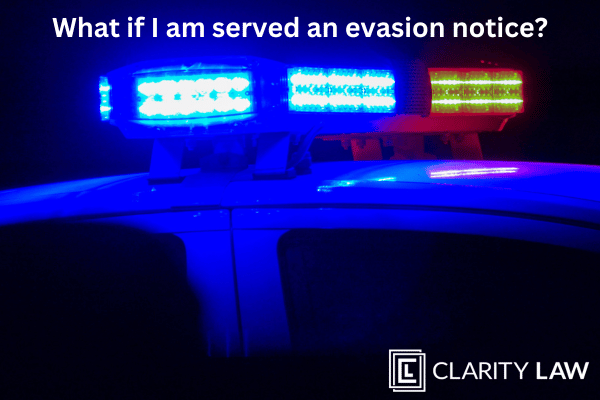
If you are served with an evasion notice it is critical to get urgent legal advice as the consequences of failing to do so are very serious.
This article summarises what an evasion charge is (also called fail to stop) and then goes on to discuss what is an evasion notice and what at the legal implications of being served one.
Understanding evasion charges
Evasion charges, commonly known as failing to stop, are treated with utmost seriousness in Queensland. The government has implemented some of the most stringent legislation in the country, reflecting their commitment to see those who evade the police face severe consequences.
To be charged with evading police in Queensland, Section 754 of the Police Powers and Responsibilities Act 2000 states that the driver of a motor vehicle must not fail to stop when directed by a police officer where a reasonable person would have stopped the vehicle given the circumstances. Essentially, if a police officer in a police vehicle attempts to stop a driver who fails to do so within a reasonable time, the driver is considered to have "evaded" the police.
Terminology: evading police vs. failure to stop vs. evasion offence
In practice, these terms are interchangeable and all refer to the same offence. In court proceedings, it is often referred to as either a "failure to stop" charge or an "evading police" charge.
Court jurisdiction
Cases involving an evading police charge are heard in the Magistrates Court.
Penalties for Evading Police
Determining the exact penalties for evading police can be complex. The law mandated a minimum penalty of 50 penalty units ($7,100) or actual imprisonment for 50 days. Plus a licence disqualification for 2 years.
Additional considerations
Evading police is also classified as a type 1 hooning charge, which carries significant consequences. For first-time Type 1 offences, the vehicle can be impounded or immobilized for 90 days. For a second offence, the vehicle may be impounded and potentially confiscated after legal proceedings.
Licence disqualification and work licences
The minimum disqualification period for evading police is two years. Unfortunately, individuals facing this charge are ineligible to apply for a work licence or special hardship licence.
What is an evasion notice?
An evasion notice is a formal document served on the owner of the motor vehicle allegedly involved in an evasion offence.
It must be personally served on the owner by the police.
What will the evasion notice state?
The evasion notice will set out the following:
-
when and where the offence was committed
-
the name and address of the person in whose name the motor vehicle was registered
-
when the offence was committed
-
that the owner must comply with the requirement to provide a statutory declaration within the 14 business days unless the owner has a reasonable excuse
-
the consequences if the owner does not comply with the requirement within the 14 business days, including an explanation of the application of section 756to the owner in any proceeding for the offence
-
the nature of the information the owner must include in the statutory declaration
As the owner what information do I need to provide to the police?
The owner must provide the name and address of the driver. If they do not know who the driver was they must provide all of the following information:
-
where the owner was when the evasion offence occurred
-
the usual location of the vehicle when it is not being used
-
the name and address of each person (a potential driver) known by the owner to have access to drive the vehicle when evasion offence occurred
-
the way each potential driver has access to drive the vehicle Example—A potential driver possesses a key for the vehicle and has access to where the vehicle is kept
-
how frequently each potential driver normally uses the vehicle and for how long each potential driver normally uses the vehicle
-
whether each potential driver uses the vehicle in connection with a business or for private use
-
whether the vehicle was reported as stolen, or otherwise being used without consent, when the evasion offence happened
-
the nature of the inquiries made by the owner to find out who was driving the vehicle when the evasion offence happened
What happens if I don’t reply to the evasion notice?
Unless the owner has a reasonable excuse they must comply with the evasion notice and provide the statutory declaration requested within 14 days.
If the owner does not do this then:
- They can be fined up to $15,400; and
- The owner will be taken to have been the driver of the vehicle when the alleged evasion offence occurred and will be prosecuted and subject to a further fine up to $7,100 or 50 days in prison and a licence disqualification for 2 years.
I sold the vehicle before the evasion offence occurred!
You still need to complete the statutory declaration and provide the police with the name and address of the person to whom the vehicle was sold.
It was a family member who drove the car and I don’t want to get them in trouble
You need to get urgent legal advice as failure to comply with the evasion notice could see you declared the driver even if you weren’t.
How long do I have to comply with the evasion notice?
You have 14 days from the date the evasion notice was served on you.
What happens if I am declared to be the driver of the vehicle?
You can, and most likely will, be charged with evading police and subject to a 2 year licence disqualification, substantial fines or 50 days in prison if found guilty.
Examples
- Bob lends his car to a friend. The friend commits an evasion offence and then leaves the state. The police didn’t catch the driver and now serve an evasion notice on Bob. Bob must complete the statutory declaration correctly within 14 days or he will be considered the driver.
- Jacks’ car is stolen and the driver fails to stop for the police. The driver escapes the police. The police serve an evasion notice on Jack. Jack must still complete the statutory declaration in 14 days.
- Susan lets her roommates borrow her car when they need to. One of her room mates takes the car and evades the police. Susan gets served an evasion notice. She doesn’t know which roommate took the car and none of them admit to driving. Susan still needs to complete the statutory declaration in full setting out who had access to the car, how frequently they drive the car and what enquiries Susan made to find out who the driver was.
- Julie lets her son use her car. The son commits an evasion offence. Julie is served with an evasion notice. Julie doesn’t want to get her son in trouble and so doesn’t tell the police her son was the driver and doesn’t complete the statutory declaration in 14 days. After 14 days Julie is considered to be the driver and will be prosecuted and subject to the same harsh penalties as if she was the driver.
Do I really need to spend money getting a lawyer?
An evasion offence is one of the most serious traffic offences in Queensland. The offence carries harsh penalties, long periods of disqualification and the possibility a criminal offence will be recorded on a person criminal history.
The act is very technical and getting the statutory declaration incorrect could mean you are considered the driver. Remember if you don’t complete the statutory declaration you can be fined up to $15,400. Then you will be prosecuted as if you were the driver and face a further fine of $7,100 (that’s up to $22,500 in maximum fines in total) or 50 days in prison and a 2 year licence disqualification.
No one served an evasion notice should try and do it themselves, this is matter where engaging a lawyer is almost mandatory.
Summary
-
Evasion charges, also known as failing to stop, are treated very seriously in Queensland.
-
To be charged with evading police, a driver must fail to stop when directed by a police officer, where a reasonable person would have stopped in the circumstances.
-
Cases involving an evading police charge are heard in the Magistrates Court.
-
The court may now impose either a fine of $7,100 or imprisonment for 50 days served in prison for an evasion offence.
-
Evading police is also classified as a type 1 hooning charge, which can lead to vehicle impoundment or confiscation for repeat offences.
-
The minimum disqualification period for evading police is two years, and individuals cannot apply for a work or special hardship licence.
-
Possible defences to an evading police charge include arguments about the practicality of stopping, the reasonableness of not stopping, or issues related to the police officer's direction to stop.
-
Responding promptly to an evasion notice and seeking urgent legal advice regarding the notice is crucial.
-
If you do not properly respond to an evasion notice you can be fined and declared to be the driver of the vehicle when the evasion offence occurred.
-
You must get legal advice if you are served an evasion notice.
How do I get more information or engage you to act for me?
If you want to engage us or just need further information or advice then you can either;
-
Use our contact form and we will contact you by email or phone at a time that suits you
-
Call us on 1300 952 255 seven days a week, 7am to 7pm
-
Click here to select a time for us to have a free 15 minute telephone conference with you
-
Email This email address is being protected from spambots. You need JavaScript enabled to view it.
-
Send us a message on Facebook Messenger
-
Click the help button at the bottom right and leave us a message
We are a no pressure law firm, we are happy to provide free initial information to assist you. If you want to engage us then great, we will give you a fixed price for our services so you will know with certainty what we will cost. All the money goes into a trust account monitored by the Queensland Law Society and cannot be taken out without your permission.
If you don’t engage us that fine too, at least you will have more information on the charge and its consequences.
Need more information?
We have a range of articles on our traffic law blog. Some of the most recent have included:
- Evading the police
- Can you be charged for watching other people do a burnout?
- Why You Should Never Represent Yourself in Court for a traffic matter
- Traffic Offender Programs
- What is a Traffic Lawyer?
- What Happens After Police Have Charged Me with a Traffic Offence?
- Do you need a Traffic Lawyer?
- Negotiating with a Prosecutor in Queensland
- What is a QP9 and why is it important to your charge?
- Special Hardship Orders v Work Licences
- Disqualification vs Suspension, what is the difference in Queensland?
- Will I get a criminal conviction for a drink driving charge?
- Drink Driving Lawyers Brisbane
- Drink Driving Lawyers Gold Coast
- Drink Driving Lawyers Sunshine Coast
- Drink Driving Lawyer Ipswich
- Drink Driving Lawyer Beenleigh
- Drink Driving Lawyer Caboolture
- Drink Driving Lawyer Strathpine
- Criminal Lawyer
What our clients say about us





